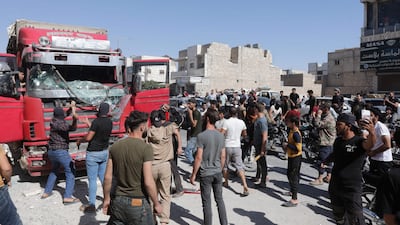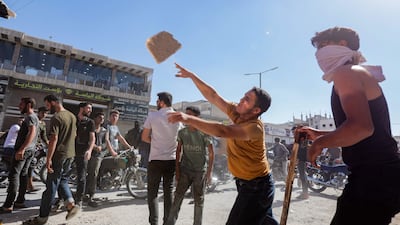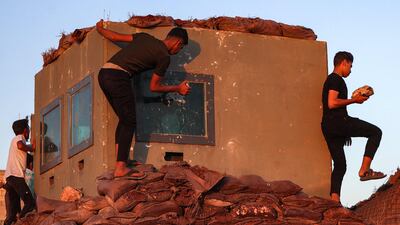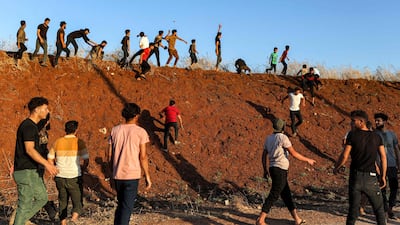Authorities in Ankara closed border crossings with Syria on Tuesday and shut down communications in its zone of control in the country after at least four people were killed in riots in the area against Turkish presence.
The unrest, which began on Monday, has tested the limits of the Turkish reach in Syria, as outrage mounts over attacks on Syrian refugees inside Turkey and at changes in Ankara's position on the Syrian civil war.
The violent attacks on Syrians in Turkey began on Sunday following allegations against a Syrian man of sexually assaulting a Syrian girl. Neither the victim nor the alleged attacker have been named.
Turkish Interior Minister Ali Yerlikaya said the authorities have detained 474 people in connection with overnight attacks on Syrian citizens in Turkey.
Fears that Ankara could turn against opponents of President Bashar Al Assad as part of a proposed rapprochement with Damascus, 13 years into the civil war, have also fuelled the violence.
"The liberated areas depend on these crossings for survival and it will be a disaster if Turkey sustains the closures," a Syrian official in an international humanitarian organisation, based near the Bab Al Hawa crossing in northern Syria, told The National.
It is one of four crossings between Turkey and areas controlled by its proxies in Syria that have shut. Others controlled by the Assad regime, and with areas under the control of a Kurdish militia, have been closed for years.
The official source said Turkish-linked internet networks in Syria were shut down in retribution for attacks in the past 24 hours against Turkish garrisons and other interests in area.

Residents also attacked and burnt lorries carrying Turkish goods at a new crossing linking the Turkish zone in Syria with areas under the control of Damascus, members of the Syrian opposition to the regime said.
The crossing opened last month as part of preparations for a possible rapprochement between Ankara and Damascus, they said.
Regional competition
In 2016, Turkey started carving out a zone in northern Syria, joining Russia, Iran and the US, as the main foreign powers in the fragmented country.
On Tuesday, a mix of militia fighters and other armed elements attacked positions manned by Turkish troops and members of the Syrian National Army, a proxy force set up by Turkey five years ago.
The troops responded by firing back, killing four people in the area of Afrin in Aleppo province, residents said.
Among the attackers, they said, were men linked with the Hayat Tahrir Al Sham, an offshoot of Al Qaeda, that is considered a de facto ally of Turkey.
"We must prevent sedition and those who commit it," Moataz Raslan, a commander in the Syrian National Army, said on X.
In Turkey, online videos purportedly showed shops and cars belonging to Syrians being set on fire in the cities of Kayseri, Gaziantep and Antakya, and Syrians being beaten by groups of men.
"The psychological state of all Syrians is bad – even Syrians with Turkish citizenship are living in the same fear," a Syrian refugee in Gaziantep said.
The Syrian Diaspora in Gaziantep, a charity organisation, said the local government migration directorate had formed a crisis cell to deal with the violence against Syrians.
Senior Turkish officials from the ruling AK Party and the main opposition, the CHP, have tried to rein in the unrest, calling for calm and an end to racist slurs against Syrians.
Turkish Vice President Cevdet Yilmaz condemned "those who try to cause turmoil in our country, with provocative purposes and hate speeches".
Turkey has received billions of dollars in funding from international donors over the past decade, primarily the EU to provide services for Syrians in the country, including health care and education.
But anti-Syrian sentiment and attacks on the refugees have grown in the country amid deteriorating economic conditions.
Hundreds of thousands of Syrians fled a crackdown by Syrian authorities on a peaceful revolt against the regime in 2011 and the subsequent civil war. The Syrian refugee population in Turkey is now about 3 million.









